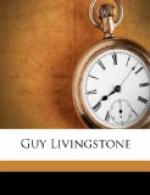“Might not remorse at the sight of the man he had injured have had something to do with his flight?” Bruce asked.
He was full of moral sentiments—that man; only you could not look at him without fancying that they sprung more from an inclination to be contradictious and disagreeable than from any depth of principle.
“Absurd,” Guy retorted. “Wasn’t he a heathen, and rather an immoral one? It was of profligates with far greater advantages of education that some one said, ‘’Le remords nait de l’abandon, et non de la faute.’ The walls of Troy were strong then, and the Destroyer-of-ships safe behind them, ‘getting herself up alarmingly’ for his return. No wonder Menelaues was eager for the duel: he was staking his loneliness against Paris’s nine points of the law.”
Sir Henry Fallowfield smiled approvingly.
“Yes,” he observed, not answering what had been said, but evidently following out a train of his own thought. “Modern exquisites have courage, and self-possession, and conceit—great elements of success with women, I own—but they have not much more. I am certain Charley, who is a favorable specimen of the class, often affects silence because he has nothing on earth to say. There is a decadence since my younger days (I hope I speak dispassionately), and how very far we fell short of the roues of the Regence! We could no more match them than a fighting-man in good training could stand up to one of the old Pict giants. Look at Richelieu: good at all points—in the battle, in the boudoir, in the Bastille—a dangerous rival at the two ages of ordinary men’s first and second childhood.”
“He was a great man in his way,” I assented. “Do you remember his answer to the Duchesse de Maine, when she asked him, for a political purpose, if he could remain faithful for one week to an intrigue then twenty-four hours old? ’Madame, quand une fois j’embrasse un parti, je suis capable des plus grandes sacrifices pour le soutenir.’ The object of that heroic constancy was the Marechale de Villars, one of the loveliest women in France. It was the sublime of fatuity—was it not?”
“Well, I don’t know,” said Charley, settling himself comfortably in his cushions, and glancing almost imperceptibly at Bruce; “they seem to fancy us, notwithstanding. We have only one great obstacle—the mothers that bore us.”
Be it known that “they,” used simply, stood in his vocabulary for the fair sex in general.
“Nonsense,” replied Fallowfield; “don’t be so ungrateful. You don’t know what you owe to those anxious parents. It helps you enormously, being the objects of perpetual warnings from husbands and chaperons, the first considering you mauvais sujets, the last mauvais partis; for you are ‘detrimentals,’ for the most part, you will own.”




